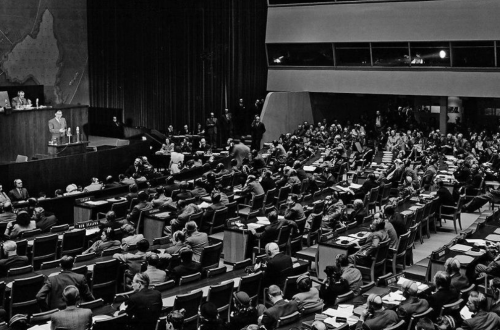Hannah Weisfeld, reacting to the initial rejection of her organisation as a member of the Zionist Federation poses an interesting question:
Ms Weisfeld said the ZF was acting as the “Zionist police”. She said: “It feels to me like this is the ZF policing the term ‘Zionism’. I do not imagine for a minute that they are going round checking on every one of their affiliate members. Who said Paul Charney gets to be the judge of what is ‘Zionist’?”
The answer, of course, is that Paul Charney no more has the right to define Zionism than any other self-selected group of people, including the Palestine Solidarity Campaign. The Zionist Federation is, however, essentially a private club composed of its own members. It has a perfect right to admit, or exclude, any group they choose. Its failure to admit Yachad on this occasion does not affect that group’s status as a Zionist organisation.
Indeed Yachad most certainly is Zionist. In the long list of positions to which Jonathan Hoffman objects, none of them contradict the central and defining pillar of Zionism: that Jews in Israel have a right to self-determine. If you want to see what anti-Zionism looks like – the twisting of logic and the ‘special case-ing’ that it invokes – I’d recommend this rubbish by Joseph Levine in The New York Times.
Jonathan Hoffman’s strong opposition to Yachad membership of the Zionist Federation appears out of step with Paul Charney’s, who has pointed out:
When an application is not accepted, such as Yachads’, then there is the opportunity to reapply after 6 months. The constitution was sent to Yachad prior to the vote, so they are aware of the process and their opportunity to reapply. Yachad is not unique. Our most recent example of this process was when Herut, a centre right organistion, applied in the same way as Yachad and was also not confirmed on first application. Herut were then subsequently accepted onto the ZF as an affiliate organisation upon later satisfying all the constitutional requirements.
This is the specific objection to Yachad’s membership:
In this case, the CC reported to the NC that the Yachad application could not be recommended. They confirmed that although Yachad have signed the Jerusalem Programme (as set out by the WZO in 2004), in practice they do not comply with it, which lies at the very core of our Constitution. The CC came to this conclusion after it found a number of examples where it was found lacking in its overall support for Israel. All Zionist organisations need to show strong support for Israel and defend injustices on both sides.
Yachad is a critic of what it sees as errors in Israeli policy, and that is indeed its major focus. However, it hasn’t been silent on attacks on Israel, Israelis and Jews. It was vocal in its opposition to Galloway’s refusal to debate with an Israeli, concerned about the Scarfe cartoon, and furious with David Ward MP.
Yachad represents an important – although not dominant – position within British liberal Zionism. I regard it as considerably more authentic and representative of a genuine constituency than, for example, J-Street: which concealed the fact that it is funded by George Soros and whose major donors included an unknown Filipino woman living in Hong Kong, who I suspect is a conduit for funds from somebody else. By contrast, I know people involved in Yachad, and I have no doubt that they are sincere.
I do not agree with all of Yachad’s positions. I do not think, for example, that there is any prospect of peace with Hamas. Any regime run by an Islamist party can at best be contained until its power wains: no negotiation and no pragmatic solution will ever be sufficient to achieve a lasting peace with such an entity. I also do not think that, post the Arab Spring, any peace deal should or could be signed with a government which does not submit itself to elections. Fatah’s control of the Palestinian Authority is illegitimate and it has no power to sign any peace deal. Moreover, the repeated refusal to acknowledge that Palestinian refugees would become citizens of Palestine, and Fatah’s insistence that the so-called “right of return” of the descendants of those who left Israel in 1948 and 1967 was not up for negotiation, has led me to conclude that it is impossible for Fatah to make a peace as long as it continues to lie to the Palestinian people about what peace will require. In fact, I think that Fatah believes that a Palestinian State will simply be stage one of its continued struggle to eliminate Israel, and that the “right of return” will be the device by which it hopes to achieve that end.
Nevertheless, I am also convinced that diversity of approach, innovation and a determination to keep searching for peace is an essential strength within Zionism. The situation that I have described above may change, and when it does, it is important for us to have the tools to react rapidly, and to seize the opportunity. For example, there were a number of reports last year which indicated that Jordan and Fatah were at least flying kites about a possible confederation between the two states. We need to be alert to respond to, and to change tack in relation to, such surprising developments. A closed shop and groupthink deprives us of the analytical agility which has traditionally been our one advantage.
These are dark times. I have a particular interest in the politics which resulted in the destruction of the Second Temple, and often recall the traditional theological explanation for its fall: sinat chinam, the breach of the command in Leviticus 19:17: do not hate your brother in your heart. I don’t believe in God, but I know enough about politics to appreciate the destructive nature of factionalism and the consequent expenditure of huge energy in attacking those who frankly should be allies.
People change their views over time. Those who don’t see everything your way today, may do so tomorrow. Do not push them away.


